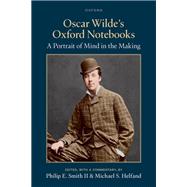
Oscar Wilde's Oxford Notebooks
by PHILIP E. SMITH II & MICHAEL S. HELFANDRent Textbook
Rent Digital
New Textbook
We're Sorry
Sold Out
Used Textbook
We're Sorry
Sold Out
Summary
In a critical commentary the editors argue that from these sources Wilde developed a synthesis of Spencerian evolutionary theory and Hegelian philosophy that shaped his aesthetic and critical theories, his political ideals, and the themes of his most important fiction. Wilde's synthesis, the editors contend, incorporated the views of scientists and social scientists like T. H Huxley, Charles Darwin, W. K. Clifford, John Tyndall, E. B. Tylor, and Herbert Spencer, historians like H. T. Buckle, W. H. Lecky, and Ernest Renan, and the English Hegelians, Benjamin Jowett and William Wallace.
Using this synthesis, Wilde confronted the major controversies of late Victorian intellectual life: the relation of mind and matter in philosophy, the origin and development of culture, and the roles of artist and critic in the improvement of society.
In addition to scrupulous annotation, this book provides a description of the manuscripts, historical evidence for dating, an introduction that describes the intellectual influence of Wilde's parents and their circle in Dublin, and a commentary that identifies the sources in the notebooks and substantially reinterprets Wilde's criticism and fiction.
An insightful and original study that will appeal to Wilde scholars, literary critics, and intellectual historians of the 19th century, the book provides a fresh look into the intellectual development of Wilde and reveals him to be a learned, radical humanist whose artistic and intellectual growth occurred within, and is representative of, the transformation of English cultural criticism after Darwin.
Author Biography
Philip Smith is the editor of Approaches to Teaching the Works of Oscar Wilde (MLA, 2008) and Oscar Wilde's Historical Criticism Notebook (Oxford University Press, 2016). He co-authored and co-edited Oscar Wilde's Oxford Notebooks: A Portrait of Mind in the Making (Oxford University Press, 1989) with Michael S. Helfand. He has also published refereed articles and invited chapters on Wilde, Constance Naden, Robert Heinlein, Ursula Le Guin, Brian Aldiss, August Wilson, John Galsworthy, Charles Olson, and on issues of curriculum, staffing, and teaching in the profession of English studies. He has retired from teaching in the English Department of the University of Pittsburgh.
Michael Helfand received a PhD in Modern Letters from the University of Iowa. He has taught 19th and 20th century English and American literature in the University of Pittsburgh. He co-authored and co-edited Oscar Wilde's Oxford Notebooks: A Portrait of Mind in the Making (Oxford University Press, 1989) with Philip Smith. He edited the Classics in American Literary Histories (8 vols.) Shanghai Foreign Education Press (1986-93). He has published essays on Victorian Psychology, Victorian Crime Fiction, T. H. Huxley, John Ruskin, Arthur Conan Doyle, and J.G. Frazer. He has been a Fulbright lecturer in China and in South Korea and served on the Fulbright nominating committees.
Table of Contents
An electronic version of this book is available through VitalSource.
This book is viewable on PC, Mac, iPhone, iPad, iPod Touch, and most smartphones.
By purchasing, you will be able to view this book online, as well as download it, for the chosen number of days.
Digital License
You are licensing a digital product for a set duration. Durations are set forth in the product description, with "Lifetime" typically meaning five (5) years of online access and permanent download to a supported device. All licenses are non-transferable.
More details can be found here.
A downloadable version of this book is available through the eCampus Reader or compatible Adobe readers.
Applications are available on iOS, Android, PC, Mac, and Windows Mobile platforms.
Please view the compatibility matrix prior to purchase.
